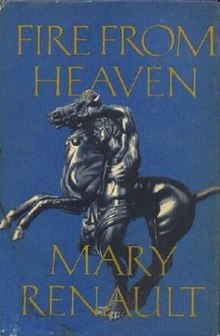Fire from Heaven

First edition, 1969
|
|
| Author | Mary Renault |
|---|---|
| Cover artist | Karl Leabo |
| Country | United States |
| Language | English |
| Series | Alexander the Great |
| Genre | Historical novel |
| Publisher | Pantheon Books |
|
Publication date
|
June 1969 |
| Media type | Print (Hardback and Paperback) |
| Pages | 375pp |
| ISBN | |
| Followed by | The Persian Boy |
Fire from Heaven is a 1969 historical novel by Mary Renault about the childhood and youth of Alexander the Great. It reportedly was a major inspiration for the Oliver Stone film Alexander. The book was nominated for the “Lost Man Booker Prize” of 1970, "a contest delayed by 40 years because a reshuffling of the fledgeling competition’s rules", but lost out to Troubles by J. G. Farrell.
Pella- the opening scene of the novel, capital city of Macedon. Pella is presented as a place of constant political struggles. It is where Alexander's childhood is spent and where most of the central relationships are formed.
Aigi- the closing scene of the novel, the old capital of Macedon, located higher in the mountains. It features a fortress near a waterfall, and is presented as the site of many important character shifts, such as loss of virginity, murder, and transformative religious experiences.
Mieza- site of a school for Alexander and the other sons of important Macedonian military leaders. Mieza is presented as a sort of Arcadian place of refuge from the wider politics of Macedon, a place of comradeship, learning, and love.
Thrace- Macedon's neighbor to the northeast. Thrace is presented as a wild, remote region which Philip's soldiers have occupied. Even more so than Macedon, Thrace remains a rough land of feuding warlords. It is noted for the blue tattoos of its inhabitants. Thrace is where Alexander first exhibits his military bravery and leadership, and where he and Hephaestion are hardened to the gruesome realities of war.
...
Wikipedia
